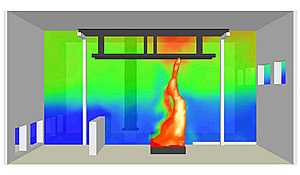Mar 12 2009
A new draft report released for public comment by the National Institute of Standards and Technology (NIST) provides a comprehensive set of “best practice” guidelines for designing building structures to resist major fires.
 Computer simulation based on a NIST fire test conducted during the investigation of the collapse of the World Trade Center towers
Computer simulation based on a NIST fire test conducted during the investigation of the collapse of the World Trade Center towers
The document, NISTIR 7563, Best Practice Guidelines for Structural Fire Resistance of Concrete and Steel Buildings, is part of the NIST response to the World Trade Center (WTC) disaster of Sept. 11, 2001, and was developed in conjunction with the agency’s technical building and fire safety investigations of WTC buildings 1 and 2 (the WTC towers) and 7.
This draft guidelines report is the result of a collaborative effort initiated by NIST that involved experts in the design and construction industry and academia. It features information on current best practices in structural fire resistance engineering in the United States and overseas, and current best knowledge in fire risk assessment, and characterization of the design fire, material properties at high temperatures, and thermal and structural response calculation methods. The document integrates state-of-the-art information in one source, enabling users to apply a performance-based approach to fire resistance design as well as the evaluation of concrete and steel structures.
NIST welcomes public comments on the draft report, downloadable at http://wtc.nist.gov, received by noon Eastern Daylight Time on April 15, 2009.